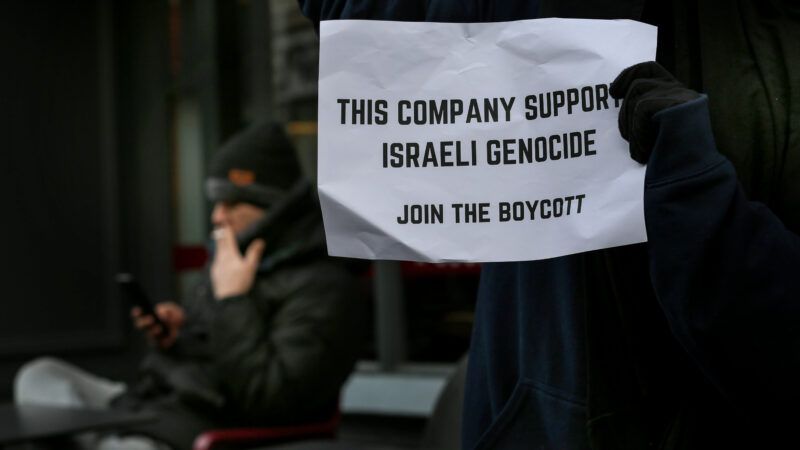Don't Blame Coca-Cola and Pepsi for America's Israel Policy
American firms are not responsible for how the taxes they pay are spent.

Local soda brands in Muslim-majority countries are eating into Coca-Cola and Pepsi's market share, Reuters reports, "due to consumer boycotts that target the globe-straddling brands as symbols of America, and by extension Israel."
The link between the U.S. government and the Israeli government is clear: The Washington Post calculates America has given $6.5 billion in security aid to Israel since its war with Hamas began on October 7 last year. But why punish civilian producers of sugary beverages that have employees, consumers, and capital all around the globe?
Beyond expressing disapproval of "symbols of America," the boycotts have a more concrete aim. The Coca-Cola Company and PepsiCo are headquartered in the United States. Coke paid $1.299 billion in taxes during the six months ended June 30, 2023, and Pepsi paid $2.262 billion for the year ended December 30, 2023. When American firms lose revenue, the American government loses tax receipts, which may, in theory, reduce military aid to Israel. The boycott movement has achieved the first two steps: Per Reuters, "Western beverage brands suffered a 7% sales decline in the first half of the year across the region, market researcher NielsenIQ says." Given the increasing disconnect between government revenue and government spending, it's unclear whether the third step was ever really on the table.
Coca-Cola has attempted to distance itself from Israel's military campaign. Al Jazeera describes a Bangladeshi ad in which a shopkeeper tells shoppers Coke is not from Israel, but rather enjoyed globally: "Even Palestine has a Coke factory," the shopkeeper says. The short-lived ad was less than persuasive to people in the Muslim-majority Bangladesh who are concerned about the financial link between American firms, the U.S. government, and Israel. Likewise, PepsiCo pleading that none of its brands "are affiliated with any government or military in the conflict," as it said in a statement to Reuters, has fallen on deaf ears.
Questions of boycotts' efficacy aside, firms are responsible for their actions, not for what the government does with funds stolen from them. Those who morally object to the war in Gaza, which has claimed the lives of thousands of civilians, often say that it's wrong to hold Palestinian civilians responsible for the heinous terrorism of Hamas. Objectors rightly argue that merely living under, and paying taxes to, a government does not make a person morally responsible for that government's actions.
By these lights, neither American citizens nor American companies are responsible for the actions of the American government or governments supported thereby. While consumers are well within their rights to spend or withhold their money on any basis, they should consider whether they have principled reasons for not drinking a can of Coke—or, if they have worse taste, a bottle of Pepsi.


Show Comments (35)